Former Maverick County Attorney Jaime “A.J.” Iracheta lost his job six weeks after filing an appeal that claimed the area’s county judge erroneously nullified a 2005 conviction without having jurisdiction, holding a hearing, considering evidence or providing sufficient notice for the state to respond.
“Unfortunately, I believe I lost my job because of it, but this is a situation of doing the right thing,” said Iracheta, who was county attorney from January 2018 until March.


 Maverick County Courthouse in Eagle Pass, Texas. Photo: Google
Maverick County Courthouse in Eagle Pass, Texas. Photo: Google





